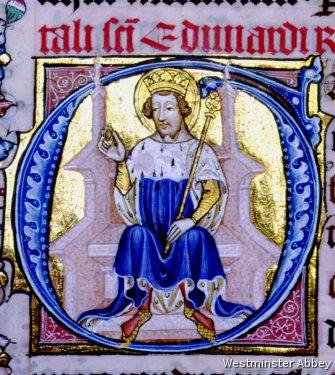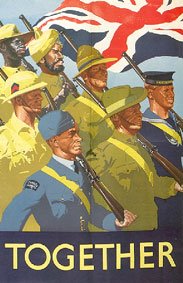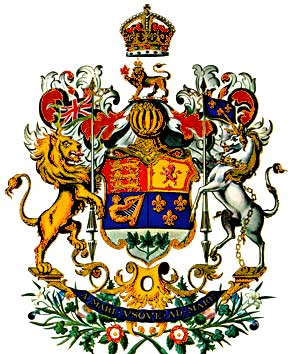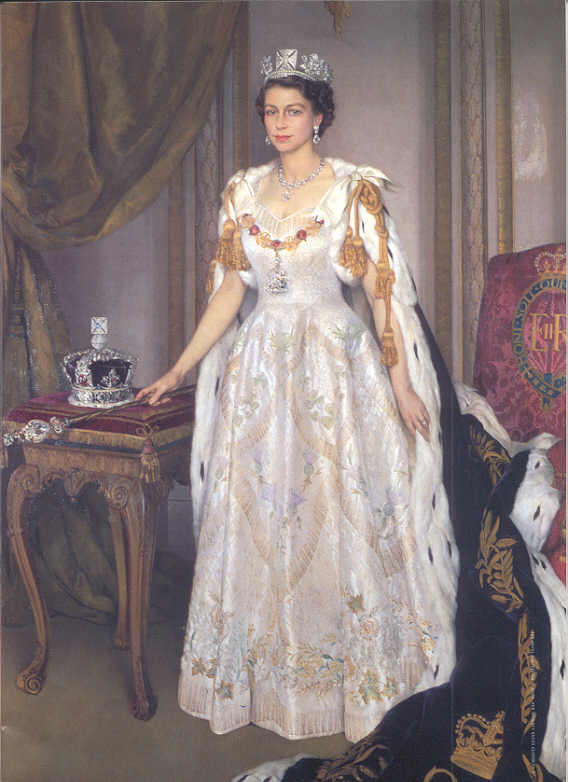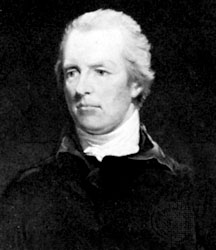[+] HONOURING OUR PATRON, SIR WINSTON CHURCHILL, VICTOR OF THE ENGLISH-SPEAKING PEOPLES
[+] HONOURING OUR QUEEN, ELIZABETH THE SECOND, ON THE 80TH YEAR OF HER BIRTH (1926 - 2006)
[+] HONOURING OUR KING, SAINT EDWARD THE CONFESSOR, ON THE 1000TH YEAR OF HIS BIRTH (1005 - 2005)
[+] HONOURING OUR HERO, LORD NELSON, ON THE BICENTENNIAL OF THE BATTLE OF TRAFALGAR (1805 - 2005)
[+] HONOURING OUR SONS, THE QUEEN'S COMMONWEALTH SOLDIERS KILLED IN THE 'WAR ON TERROR'
[+] HONOURING OUR VETS ON THE 150TH ANNIVERSARY OF THE VICTORIA CROSS (1856 - 2006)
Professor Michael Bliss of the University of Toronto (author, historian and appalling anti-monarchist), eloquently confirms the gist of my May 13 post in the National Post today, declaring the government-sponsored parliamentary crisis a "shocking act of proto-tyranny". Here it is via Andrew Coyne:
Canadians ought to realize that this week's breakdown of their Parliament is far more serious than any of the thuggish revelations from the Gomery commission. As of this weekend, we are in the historically unprecedented situation of having a Prime Minister who is clinging to office by recklessly disregarding the fundamental principles of our democracy. It is a shocking act of proto-tyranny, which justifies the extreme resort of intervention by the Governor-General.
I am not writing this lightly or with any knowledge of or involvement in any party's strategy. Nor do I think that most Canadians understand or perhaps even care about the complexities of the constitutional imbroglio that has unfolded since the opposition began defeating the government in the Commons last Wednesday. Canada this weekend has a government clinging to office against the repeatedly expressed wishes of a majority of the democratically elected members of the House of Commons.
In some countries at some times in their history, a situation like this would lead to citizens taking to the streets in protest. Instead, even those Canadians who notice the situation are content with the thought that it will probably only last until Thursday. Surely a few days of unconstitutionality can't matter.
But they do matter immensely, both for their immediate implications, and as precedent. The defeat of the Martin government on Tuesday came on a procedural, not a confidence motion, but it was such a clear sign that a majority of the House of Commons do not support the government that virtually all constitutional experts are agreed that an immediate test of the House's confidence was required.
Instead of doing this, the government proposed a nine-day delay, offering reasons for the delay so transparently bogus as to affront the intelligence of a 10-year-old. The British Columbia election has nothing whatever to do with the affairs of the Parliament of Canada. The visit of the Queen, a constitutional monarch whose activities are absolutely ceremonial and apolitical, cannot possibly in the 21st century take precedence over the need to resolve an impasse in our elected Parliament.
Paul Martin had a constitutional and moral responsibility to ascertain the confidence of the House of Commons on Wednesday. When he failed in this responsibility he was thumbing his nose at the conventions of responsible government and modern democracy. His government continued to disregard their constitutional responsibilities on Thursday and yesterday, leaving a frustrated opposition to demonstrate its lack of confidence repeatedly by taking control of parliamentary affairs in one vote after another. A government that has been shown to be unable to govern has stated that it will continue to stand in contempt of Parliament for the first three days of next week, but will finally face an explicit test of confidence on Thursday.
The problem with this strategy is that the unconstitutional delay in scheduling the vote of confidence saps it of its legitimacy. If the ministry, which is also manipulating all the levers of power every day it clings to office, wins the vote on Thursday the opposition will have every right to cry foul and continue to contest the government's legitimacy. It will almost certainly paralyze Parliament. At the very least the government's strategy is creating parliamentary bitterness and distrust such as we have never seen in the modern history of Canada. At worst, we are creating the kinds of precedents involving the erosion of our Constitution that in other countries have been initial steps on the road to dictatorship...



